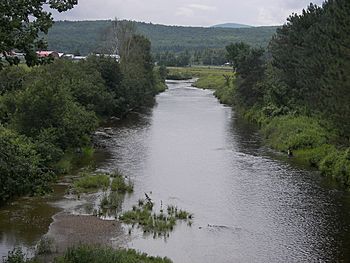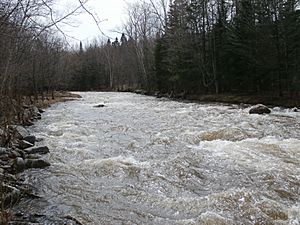Arnold River (lac aux Araignées) facts for kids
The Arnold River is a river in Quebec, Canada. It flows into Lac des Joncs, which then leads to Lake Mégantic. Lake Mégantic is a big lake that also gets water from Lac aux Araignées. It's the main starting point for the Chaudière River, which flows north and eventually joins the Saint Lawrence River.
The Arnold River passes through the towns of Saint-Augustin-de-Woburn, Piopolis, and Frontenac. These towns are in the Le Granit Regional County Municipality, which is part of the Estrie region in Quebec.
Quick facts for kids Arnold River |
|
|---|---|

Arnold River between Lac Mégantic and Woburn
|
|
| Native name | Rivière Arnold |
| Country | Canada |
| Province | Quebec |
| Region | Estrie |
| MRC | Le Granit Regional County Municipality |
| Physical characteristics | |
| Main source | Arnold Lake Saint-Augustin-de-Woburn 577 metres (1,893 ft) 45°28′35″N 71°01′23″W / 45.476435°N 71.022988°W |
| River mouth | Lake Mégantic, Chaudière River Frontenac 392 metres (1,286 ft) 45°27′21″N 70°51′55″W / 45.45583°N 70.86528°W |
| Length | 28.2 kilometres (17.5 mi) |
| Basin features | |
| Progression | Lake Mégantic, Chaudière River, St. Lawrence River |
| River system | St. Lawrence River |
| Basin size | 265 kilometres (164.66 mi) |
| Tributaries |
|
Contents
Where Does the Arnold River Flow?
The Arnold River starts in Arnold Lake. This lake is about 2.4 kilometers long and sits at an altitude of 754 meters. It's located in the southern part of Saint-Augustin-de-Woburn.
Interestingly, Arnold Lake is partly in Canada and partly in the United States. There's a dam at the end of the lake that helps control the water flow. The Arnold River's average flow is about 5 cubic meters per second. Its watershed, which is the area of land that drains into the river, covers 265 square kilometers.
Journey of the River
The Arnold River flows for about 28.2 kilometers. It starts from Arnold Lake and generally flows north. Along its path, it meets several smaller streams and brooks.
The river eventually empties into the outlet of Lac des Joncs. This happens about 1.5 kilometers upstream from where Lac des Joncs joins Lake Mégantic. The spot where the Arnold River meets Lac des Joncs is about 7.2 kilometers north of the village of Saint-Augustin-de-Woburn.
Nearby Rivers and Lakes
The Arnold River is surrounded by other important bodies of water.
- To the north, you'll find Lake Mégantic and the rivière aux Araignées.
- To the east, there's the rivière aux Araignées and Vaseux stream.
- To the south, you'll find Morin Creek, the Cupsuptic River (in the USA), and Porter Brook (in the USA).
- To the west, there's the first east branch of the Magalloway River (in the USA), Deer Brook (in the USA), and the Bergeron River.
Why is it Called Arnold River?
The Arnold River is named after Benedict Arnold (1741-1801). He was an American general who led an army across this river in 1775. His goal was to capture Quebec City during a historical event called the invasion of Canada.
Benedict Arnold was born in New England. When the American colonies started fighting for independence from England, he joined the American side. In 1775, he went to Quebec to check out the British defenses. Based on his report, the American Congress decided to send troops to take control of the Saint Lawrence River valley.
Arnold led one of these armies. His journey took him along the Arnold River, the rivière aux Araignées, Lake Mégantic, and the Chaudière River. His troops faced many challenges during this expedition. They arrived near Quebec City in November 1775. However, the British forces were strong, and the Americans were defeated in a battle on December 30-31, 1775.
Later, after a big American victory at Saratoga in 1777, General Arnold became the commanding officer of West Point. However, he later faced difficulties and left the American side, moving to London. He died there in 1801. Despite his later troubles, many consider Arnold to have been a very skilled American general.
The name "rivière Arnold" was officially recognized on December 5, 1968, by the Commission de toponymie du Québec (Quebec Toponymy Commission).
 | Leon Lynch |
 | Milton P. Webster |
 | Ferdinand Smith |



